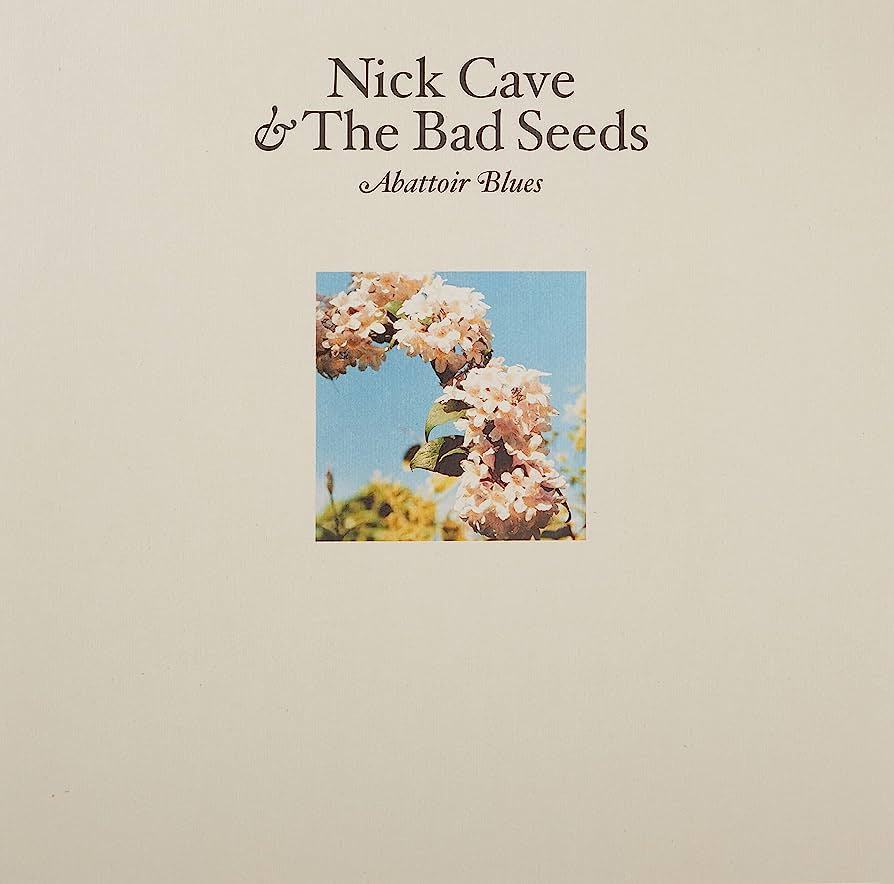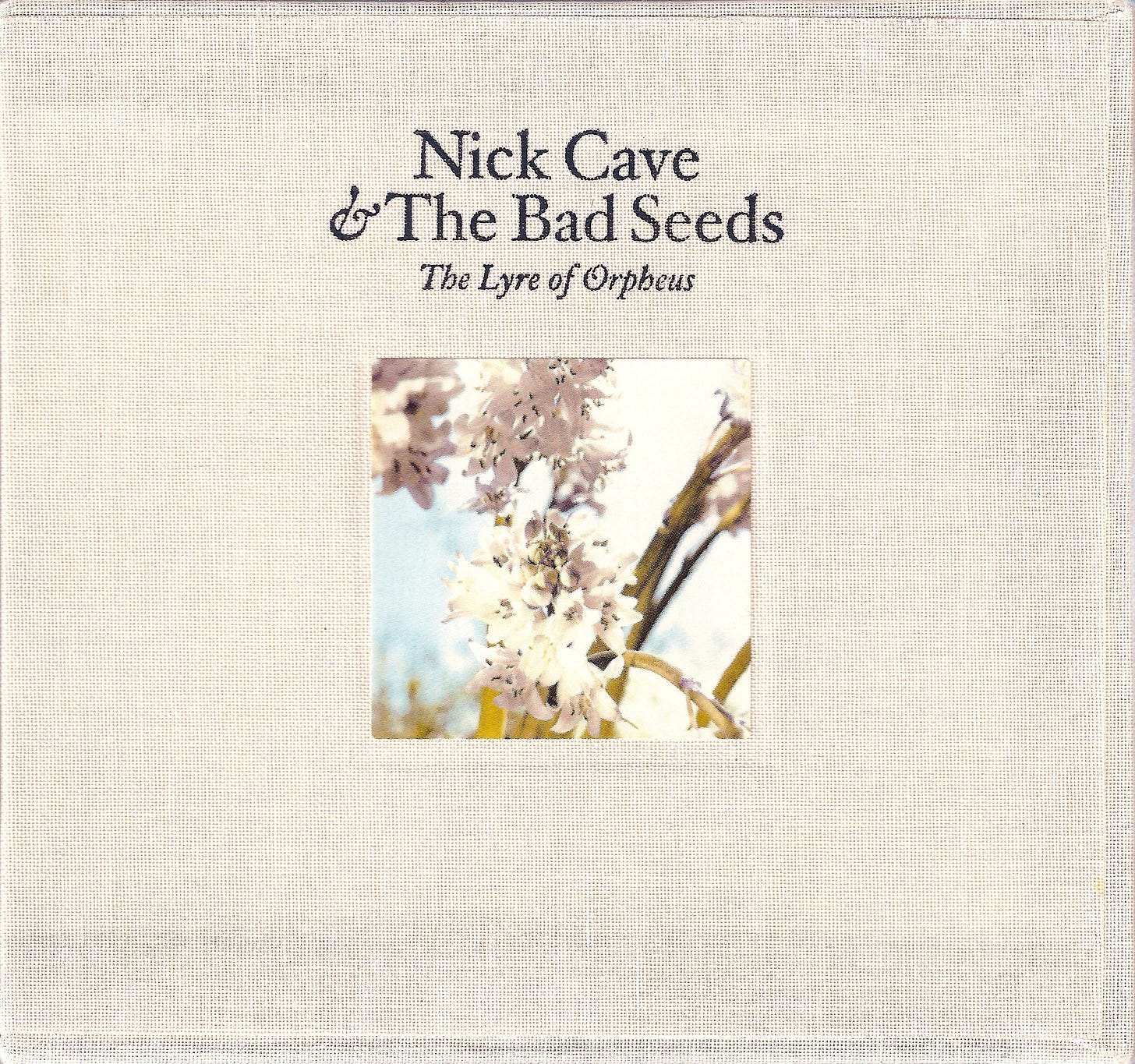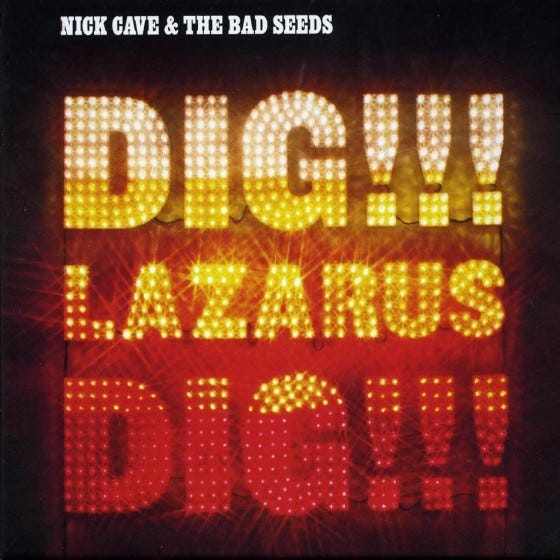I’m really happy to welcome back for the final section of this Nick Cave retrospective, don’t forget that you can catch up on previous editions here
Welcome back to the final instalment of my Bad Seeds retrospective.
After such a strong run of albums last time out (Henry’s Dream’ up to Nocturama) this stretch, taking us through from 2004 to the present day, is a dramatic tale, full of change, tragedy, and redemption.
For me, it can sometimes be a mixed bag, but always one with plenty of treats to pull out. So without further delay or preamble, let us (after a brief commercial!) dip in …
If you like what you read, then please give my (similarly themed) novel a try. It is serialised (for free) on Substack, with every chapter released so far available via the attached ‘catch-up’ link.
Challenge 69 - The Story So Far
Abattoir Blues (2004) - ‘Fable Of The Brown Ape’
“So long, goodbye, farewell.”
As somebody once (never) said, “Hindsight can be an educational thing!”
I am pretty confident, lyrically, I had little idea what was going on with Abattoir Blues when it first came out in 2004 (or indeed its sister piece, The Lyre of Orpheus, which we’ll examine separately), but somehow looking back on it now, in the reflected light of the spiritual/humanitarian journey Cave has taken over more recent times, as distilled through his words, my re-evaluation brought a sense of revelation.
While mankind may be capable of monstrous deeds, and seemingly hardwired to cause suffering, Nick seems to advocate, it also has a unique, redeeming capability to temper these urges, and ultimately defeat them, through small, individual acts of human kindness. Such a belief system would be sorely tested later (through deep personal tragedy), only to re-emerge (from Push the Sky Away onwards) stronger and more committed, but its lyrical roots can be traced to these two 2004 collections.
But enough of the metaphysical b******s (for now); what about the music?
Well, Abattoir Blues is possibly The Bad Seeds’ most full-on Rock’n’roll/Blues album (either before or since), with Pitchfork pitching it as, “full-throated gospel-punk.”
There had been just a single change in the band line-up since Nocturama, but a hugely significant one, with long-time, influential Seed Blixa Bargeld leaving the fold (which we’ll revisit at the end) to be replaced by James Johnston of Gallon Drunk on organ, with the ever-versatile Mick Harvey taking over on guitar duties. These changes seem to have been absorbed seamlessly, though, with the ever-ready Bad Seeds rattling through the recording of 17 tracks, over two albums, in just 12 days.
This indication of urgency is certainly reflected in ‘Get Ready for Love’, which blasts through its four verses and five insistent choruses without pausing for breath, easily qualifying the track as the band’s most upbeat opener ever.
‘Cannibal’s Hymn’ then introduces us to the ‘devotional dichotomy’ theme hinted at earlier. It is largely a song of hope but with a warning attached. “If you’re gonna dine with them cannibals,” Cave suggests, then, “you’re gonna get eaten.”
The industrial sounding ‘Hiding All Away’ shows Bargeld may have departed in body, but his anarchic influence has hung around. It also boasts my favourite couplet on the album, as Nick cunningly rhymes, “imitators,” with, “potatoes.”
‘Messiah Ward’ is a lovely blues shuffle of a song that makes great use of the London Community Gospel Choir, providing backing vocals throughout.
A, “great art often comes from adversity,” theory pervades ‘There She Goes My Beautiful World’, referencing, among others, Johnny Thunders (another of Cave’s influences) as being only, “half alive when he wrote ‘Chinese Rocks.”
The title track ‘Abattoir Blues’ includes the clearest lyrical outing yet of the core theme that redemption can be achieved through small acts of mercy, while
‘Let The Bells Ring’ maybe brings the clearest expression of ‘faith’ Nick has ever penned with, “behold your mighty work, that towers over the uncaring ground.” In the context of everything before, this would have made a fitting album closer.
This just leaves two as yet unreferenced tracks, a real case of the good and the bad!
‘Nature Boy’ is by some distance my favourite track on what is already a strong Bad Seeds’ album. The music (with a full band ‘credit’) has a joyous, rollicking momentum, vocally it is one of Cave’s best performances to date (with subtle verse variations, and sweet, chorally supported choruses), and lyrically, it’s a masterpiece, with its challenging wordplay (“ordinary slaughter,” and “routine atrocity”) and smart rhyming (“wisteria” with “hysteria”) never distracting from the core message (delivered via some fatherly advice) that, “in the end it is beauty that is going to save the world.”
If only, as I proposed earlier, ‘Abattoir Blues’ ended with ‘Let The Bells Ring”, then it would go out on a Run Out Grooves high, but it doesn’t, so sadly, I now have to finish on the album’s one and only ‘low’. In fact, were I to rank all eighteen Bad Seed closing tracks in order, I’m afraid ‘Fable of the Brown Ape’ would finish bottom of the pile.
Musically the song has little to commend it (indeed, we may be back on “routine atrocity” territory), but worse still, it is a lyrical car crash. Largely incomprehensible (in an irritating rather than thought-provoking way), the song’s words come over as some sort of (failed) attempt at a comedic take on an Aesop myth.
There is online speculation the song is meant as a tribute to Blixa Bargeld (whose real surname is Emmerich), a supposition the, “so long, goodbye, farewell,” chorus would seem to support; but even if that’s the case (driven by thankfulness or bitterness?) then it is still impossible to decipher all the allegorical references to cows, serpents, and apes; and frankly, less than halfway through, I’m already too annoyed to care anyway!
Sorry to end on a downbeat. I would wholeheartedly recommend Abattoir Blues, it is a great album, but I wholeheartedly propose you stop listening before Father Emmerich enters his barn!
Given we are already fabulising, we should quickly move on to The Lyre of Orpheus.
The Lyre of Orpheus (2004) - ‘O Children’
“It’s short, it’s simple, it’s crystal clear.”
As somebody once (almost) said, “There is always a calm after the storm!”
The Lyre of Orpheus, as the second, yet distinct, helping of a smartly sequenced double album confectionary, definitely constitutes an obverse side of the coin, a wholly calmer, more refined riposte to its noisier neighbour. And none the worse for it.
In a different way, however, it can be seen as a mirror image of Abattoir Blues. Just as part one finished with a stinker, instalment two kicks things off with another!
A lot of the same mythical elements are in play as the record opens with its title track, and a similar intent to employ them with a comedic twist. But we all know that feeling of audience dread, as a comedian ‘dies’ on stage, and that’s how I feel listening to The Lyre of Orpheus. The joke just isn’t funny. Musically, it is a morsel more interesting than ‘Fable of the Brown Ape’, so never quite as irritating, but it is a close run thing. And I’m not alone; Pitchfork’s review calls the song;
A tedious rewrite of the Greek myth [which] sounds no better than it looks on paper.
Having evicted the duffer out the door first thing, though, there isn’t the merest whiff of another turning up during the remainder of the album. This may well be a more serene affair than Abattoir Blues, but if anything, the songwriting is even stronger.
The very next note, however, could (probably should) have proven equally disastrous, as ‘Breathless’ starts, courtesy of Warren Ellis, with what must surely be the worst, most tuneless, flute solo in recording history. Whilst a consummate multi-instrumentalist, Ellis was notoriously poor on the flute, with bandmate Conway Savage once telling him, after a Dirty Three gig, “Good show, mate, but if I see you play that flute again, I’ll ram it up your ar5e.”
This was advice Warren took to heart, so hadn’t touched his flute for ten years before Cave and (producer) Nick Launay decided the song needed it. True to form, Ellis’s solo attempt went so badly that, after several takes, all agreed it, “sounds like sh1t.” Strangely though, after putting them all together (some backwards!), and adding a ton of reverb, the (still clearly tuneless) fluting unexpectedly forms a lovely start to a beautiful song.1
Everything runs more smoothly (and tunefully!) from here on in, though:
‘Babe, You Turn Me On’ is a timeless love song, driven by affecting ‘spoken’ vocal verses that always remind me, in a good way, of Tex Ritter’s ‘The Deck of Cards’.
‘Easy Money’ brings a welcome (brief) reemergence of Nick’s narrative storytelling style, with a sad-hearted tale told from the perspective of a pr0stitute.
The album’s one upbeat number comes next, with ‘Supernaturally’s otherworldly verses driven along by the insistent rhythm of the song’s, “Hey! Ho!” choruses
It is back to ballads for ‘Spell’, but a strong Cave vocal (supported nicely by the choir) and some lovely violin (thankfully!) work from Warren make it a good one.
While ‘Carry Me’, carried along by an understated ‘orchestral’ motif and ‘hymnal’ sound, becomes the perfect hors d'oeuvre for the main course that follows.
‘O Children’ makes (in diametric opposition to Abattoir Blues) a wonderful, dramatic conclusion to The Lyre of Orpheus, one which, I’ll boldly claim, constitutes the best-ever Run Out Groove on any Bad Seeds album. Its slow start is followed by a subtle, almost imperceptible build of the lament, both vocally and musically (a trick at which the Bad Seeds are past masters), reaching a glorious climax before a poignant fade.
Taken as a whole, this is one of my all-time favourite Cave compositions, and a song that works even better in a live incarnation, an opinion (for once) Nick seems to agree with, having resurrected the song as an ever-present staple of the band’s 2022 touring.
It has become impossible now, though to hear this song without visualising the image below:
Yes, ‘O Children’ is forever destined now to be best known for the ‘Harry & Hermione dance’ scene from Harry Potter and the Deathly Hallows. But rather than causing a distraction, the track is so well utilised in the film that it’s cinematic outing just adds further poignancy to a song that’s already overflowing with it. Just take a look!
'O Children' - Harry & Hermione's Dance
Dig, Lazarus, Dig!!! (2008) - ‘More News from Nowhere’
“Someone must have stuck something in my drink.”
Despite introducing each Bad Seeds album retrospective with an image of its artwork, these have, to date, remained unremarked upon. The ‘Dig, Lazarus, Dig!!!’ cover, however stands out for a garishness which, wholly appropriately, announces (up in lights!) the luridness that lies within. And, as things turn out, garish is good.
This was the fourteenth Bad Seeds studio album (released four years after its predecessor), a milestone by which time most bands are to be found, at best, treading water, or, more likely, drained of innovation or inspiration. That’s not the case here though; this is a cracking, metamorphic record that breaks new Bad Seed ground.
The group (or the vast majority of them at least) hadn’t remained idle since Abattoir Blues/Lyre of Orpheus anyway, having recorded and released their first Grinderman side-project album in 2007 (with a second to follow in 2010). Cave once described Grinderman as, "a mammoth midlife crisis," granting him leave to, “visit my 'lower self' and make chaotic noise.” Set in that context, and timeline, it is easy to interpret the unruliness and irreverence that pervades Dig, Lazarus, Dig!!! as Grinderman 1.5.
However, you choose to categorise Dig, Lazarus, Dig!!! though, it was positively received, by fans and critics alike, as a welcome new Bad Seed sound, with the NME declaring the band had, “bared their teeth again,” with a “gothic psycho-s3xual apocalypse.” Not bad for a record made twenty-four years after debut and recorded in just five days.
Having (twice) stumbled over ‘mythologising’ last time out, Nick finally cracks it here (and succeeds in making it funny) with the ‘title track’ opener. Relocating Lazarus to a modern-day (corrupt) New York and LA works, and while the stream-of-consciousness lyrics never make it entirely clear what, “there’s definitely something going on upstairs!”
The real stand-out tracks come at the end, but that shouldn’t be allowed to gloss over the high quality of songwriting and musicianship that precedes them:
‘Today’s Lesson’ comes over like some garage rock reinterpretation of the Velvet Underground, but with an even more tortured mind and added noise loops.
A loping, bluesy melody underscores ‘Moonland’s largely incomprehensible lyrics, surrounding a car journey, that somehow ends up sounding full of import.
‘Night of the Lotus Eaters’ is constructed like an eerie film score, for a scene packed full of menace. One David Lynch would pay good money for.
The Bad Seeds go grunge for ‘Albert Goes West’ and prove excellent at it, before wittingly (and wittily) sabotaging that concept with a “sha-la-la-la,” chorus.
‘We Call Upon the Author’ is an odd mix of rap and literary criticism, with Nick managing to shoehorn in his distaste for Bukowski and his love of John Berryman.
Warren is credited with Fender Mandocaster for ‘Hold on to Yourself’, with the instrument’s screeching backing counterintuitively adding to the song’s beauty.
‘Lie Down Here (& be my Girl)’ just reeks of a band having fun, particularly in the unrehearsed, shambolic backing vocals of its ‘call and response’ choruses, and
After all these oddities, ‘Jesus of the Moon’ sounds shockingly normal, but it is a classic Cave ballad that wouldn’t sound out of place on ‘No More Shall We Part’.
This delivers us, having been challenged and entertained in equal measure, to ‘Midnight Man’, my favourite track on the album. More noise loops from Warren perfectly complement the punky-sounding guitar and organ, and Nick’s vocals grow ever more confident as they pick their way through a sorry tale of s3xual jealousy.
The final song, ‘More News from Nowhere’, then continues similarly, although this time complete with a distinct Dylanesque twist, albeit one taken from Bob Dylan’s lesser known ‘carnal perversion’ phase!
The lyrics are pure, “midlife crisis,” Grinderman, with Cave working his way, verse by verse, through a series of liaisons and conquests, none of them appearing to deliver any satisfaction, ending up back with Deanna (not heard of since 1998’s Tender Prey) who, we are told, is ultimately, “to blame,” for, “all the horrors that have befallen me.”
It is hard to argue with this song’s lyrical supposition that someone may have spiked the drinks, with things growing more, “strange looking,” as its verses progress, but despite it taking nearly eight minutes before Nick bids us, “goodbye,” ‘More News from Nowhere’ (unlike some earlier Bad Seed closers) never outstays its welcome.
Having re-listened to Dig, Lazarus, Dig!!!, and found it a far better, more intriguing, experience than I remembered, it became retrospectively clear how much the album heralded the passing of the ‘musical director’ torch; from the safe hands of Mick Harvey (tellingly never in the Grinderman gang) over to a more avant-garde Warren Ellis.
While in many ways this feels a shame (with Nick and Mick having been friends and collaborators since their schooldays), and some will inevitably regard Warren as the Yoko Ono who ‘broke up the band’, it is indisputable, given the evidence of this album, that Ellis was bringing something new and reinvigorating to the Bad Seed table.
‘Dig, Lazarus, Dig!!!’ held a tantalising prospect of more Bad Seed flowering to come!
Come back later this weekend for the concluding part of this journey!
Before moving on (and while on the subject of poignancy!), there is a lovely postscript to the earlier ‘crap flute’ on ‘Breathless’ story. As related by Nick in his ‘Red Hand Files’, Warren Ellis received a handwritten note from Conway Savage, just prior to his death, which simply (and classily) read, “Warren, I was wrong about the flute!”









